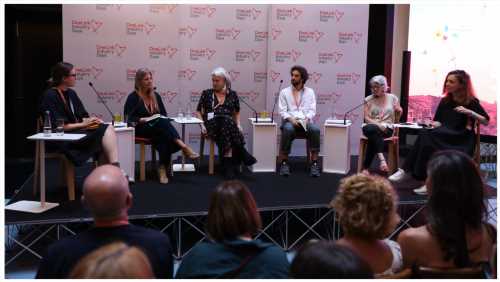Documentary filmmakers were reminded of the importance of storytelling during a panel discussion about their craft as part of the Sarajevo Film Festival’s industry program Cinelink earlier this week.
“It’s about telling the story. It doesn’t have to be a complex story. It could be anything, but it’s the way you tell it and it’s the characters you tell it through,” said Lucie Kon, commissioning editor at BBC’s doc strand Storyville. She explained that filmmakers should package their project not only with a brilliant story, but one that can charm a broad audience within its first five minutes.
The visuals should also be flashy. “Even the still that tells you what story it is on the poster needs to be like: ‘Wow, I want to see that!’”
One project that impressed Kon was the Croatian film “Pavilion 6” by Goran Dević, featured in Cinelink’s Docu Rough Cut Boutique, a platform for docs from the Balkan region. The observational film follows conversations in a line for COVID vaccinations in Zagreb.
“We’ve got COVID-related PTSD and we don’t want to go there… but it was just a really interesting, really amusing slice of life for what was a very difficult time for pretty much everyone in the world. So, it’s [about] finding joy as well,” she said.
Although the decision-makers on the panel acknowledged that we live in difficult and uncertain times, they also welcomed comic relief in projects. “Comedy is important and I think the world needs more comedy right now,” said Heather Haynes, associate director for festival programming at Hot Docs.
Haynes added that it’s important to show the persistence of memory in films dealing with conflict and PTSD, “so we don’t repeat [mistakes],” she said. “We need to keep the memory alive.”
Fremantle’s global head of documentaries Mandy Chang said it’s difficult to get geopolitical documentaries made in the current climate. “They’re important stories… but the door is really closed,” she said.
Chang also predicted a surfeit of true crime stories, a genre that has the potential to yield a lot of creativity and layered stories in her opinion. “True Crime can be about all sorts of things,” she said.
Chang, who said she was uncomfortable with the term “decision-maker,” emphasized that filmmaking is a collaborative process, not only within the filmmaking team, but also between the commissioner and the filmmakers.
Chang said she’d seen documentaries where the filmmakers had been really struggling to deliver on a mandate turn into beautiful films, “and that came out of the blood, sweat and tears of a lot of people putting it together, and also people listening, because that’s really important.”
Read More About:
Source: Read Full Article
